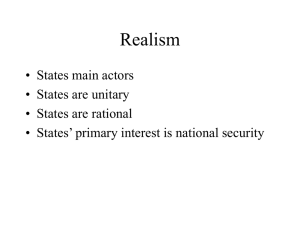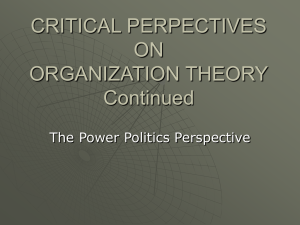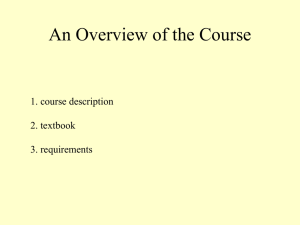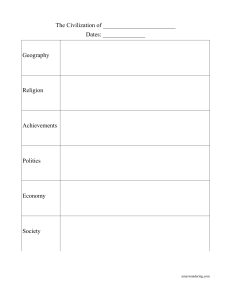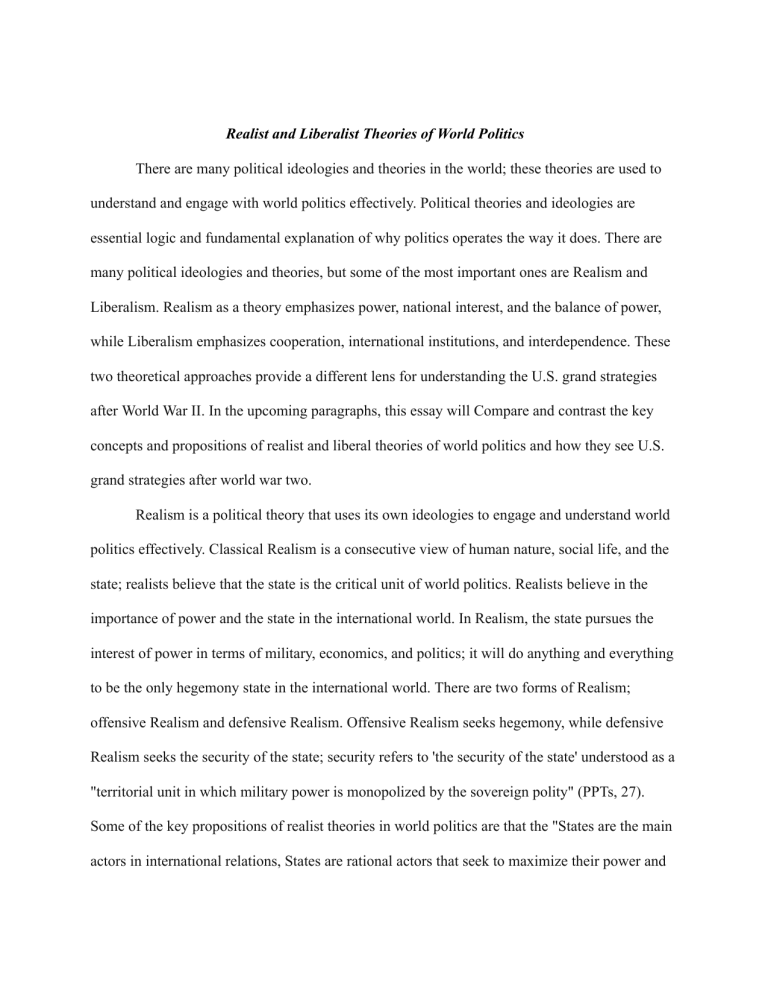
Realist and Liberalist Theories of World Politics There are many political ideologies and theories in the world; these theories are used to understand and engage with world politics effectively. Political theories and ideologies are essential logic and fundamental explanation of why politics operates the way it does. There are many political ideologies and theories, but some of the most important ones are Realism and Liberalism. Realism as a theory emphasizes power, national interest, and the balance of power, while Liberalism emphasizes cooperation, international institutions, and interdependence. These two theoretical approaches provide a different lens for understanding the U.S. grand strategies after World War II. In the upcoming paragraphs, this essay will Compare and contrast the key concepts and propositions of realist and liberal theories of world politics and how they see U.S. grand strategies after world war two. Realism is a political theory that uses its own ideologies to engage and understand world politics effectively. Classical Realism is a consecutive view of human nature, social life, and the state; realists believe that the state is the critical unit of world politics. Realists believe in the importance of power and the state in the international world. In Realism, the state pursues the interest of power in terms of military, economics, and politics; it will do anything and everything to be the only hegemony state in the international world. There are two forms of Realism; offensive Realism and defensive Realism. Offensive Realism seeks hegemony, while defensive Realism seeks the security of the state; security refers to 'the security of the state' understood as a "territorial unit in which military power is monopolized by the sovereign polity" (PPTs, 27). Some of the key propositions of realist theories in world politics are that the "States are the main actors in international relations, States are rational actors that seek to maximize their power and ensure their survival" (PPTS, 26). Realists also believe in an anarchic international system, meaning there is no higher authority above the state level, or in a sense, a nation without a government and or the state being the only one giving order and having control. Other key proportions of Realism are "The balance of power is a key factor in maintaining stability in the international system" and "Conflict is inevitable in international relations." (PPTS, 26). As can be seen, realist theory revolves around the hegemony power of one state and its goals of doing whatever is necessary to maximize its power and ensure the state's survival. According to Realism, the U.S. grand strategy after World War II was driven by a desire to maintain a dominant position in the international system. Many realists interpret the U.S. grand strategies after world war two as a way of maintaining and achieving U.S. hegemony. Realists state that the U.S. was able to achieve hegemony and the emergence of rival superpowers by using military force, creating alliances, and pursuing economic and political influence. Many realist theorists, such as Nicholas Spykman (1893-1943), who was the founder of the classical realist school in American foreign policy, focused his work mainly on the risk of U.S. isolationism (after world war two) in relation to the hemispheric defense of U.S. in a geographical separation from Europe and Asia by oceans. He wrote books and spoke about 'America's Strategy In World Politics' (1942), in which he mentions how "America's Strategy in World Politics was concerned with the critical dynamic of the balance of power and its impact on U.S. foreign policy" (PPTS, 4). Spykman believed that a state could only survive and have security by 'being a little stronger' than potential 'enemies.' He states in his America's Strategy in World Politics, 1942, that "If they wish to survive, [states] must be willing to go to war to preserve a balance against the growing hegemonic power of the period.". In this case, Spykman is talking about the U.S.; if the U.S. wishes to be a hegemonic country, it has to be willing to go to war in order to preserve a balance against any growing hegemonic power/state. Spykman also mentions how the only thing that would hurt the American strategy of becoming a hegemonic power is if there is "an alliance of Europe and Asia forms a counter-force to U.S. global power" (PPTS,11). This is because Spykman believes that hemispheric defense is not a defense and that the ocean has become a 'highway' for navies. The way to prevent this is through a conserving balance of power in Asia and Europe by letting no hegemonic power emerge, using Asia's access to critical resources, etc., to benefit the U.S., which is a form of offensive Realism. Another strategy Spykman mentions to keep the U.S. as a hegemonic power is by leaving Germany strong after world war two so that it will "be able to counter Russia's power, i.e., create a balance between weaker foes, Germany and Russia." (PPTS, 15). Other realists, such as Barry Posen, also believe that the U.S. should continue to dominate world politics by spreading the capitalist market globally. Posen states that the U.S. "needs a new grand strategy of Restraint" (PPTS, 19), meaning that the U.S. should prevent a powerful rival from 'upending' the global balance of power, specifically a single hegemon in Eurasia since it could be potentially treen the U.S. As we know it, the U.S.'s main goal after World War II was to be the only hegemonic power in terms of politics, economy, and military within the international world. Realists understood the nature of U.S. strategy as characterized by the use of military force, the creation of alliances, and the pursuit of economic and political influence. Similar to Realism, Liberalism is a political theory that uses liberal ideologies to engage and understand world politics effectively. Liberalism revolved around the idea of economic and political understanding of the capital market; it also centered around individual methodology. Liberalism emerged as a theory in the 1700s and 1800s when feudalism ended, and capitalism began in England and Western Europe. Capitalism involves the privatization of peasant land by landlords forced into market dependence and wage labor; Liberalism is the defender of capitalism. Liberalism believes that "world politics is determined primarily by the domestic character of states; liberal states are prosperous and peaceful, non-liberal states are not" (PPTS, 3). Liberalists also believe that Capitalism "is a fair and self-adjusting system of market exchange relations between self-seeking individuals, buying and selling commodities for personal consumption" (PPTS, 29). This is because Liberalism is a political theory that branches off capitalism, so liberals support capitalism and have similar beliefs to capitalize on. Some of the fundamental proposition in Liberalism is that "Individuals are key actors or market economies and democratic state, Capitalism is theorized as equal, commodity exchange relations between self-seeking individuals, all of whom benefit" (PPTS, 31), and that "value is determined by supply and demand, …comparative cost or factors advantage in world trade" (PPTS, 31)and limited power of the state. Liberals also believe in security but in terms of individualism. Individuals are able "to own private property, exchange commodities in the market, vote for political leadership, and hold rights against the state." (PPTS, 29). As can be seen, liberalists believe in a limited state, free trade, and an emphasis on individualism. According to Liberalism, the U.S. grand strategy after World War II was driven by a desire/ importance of economic interdependence, responsibility to protect in terms of human rights, genocides, civil war, etc., and having global institutions reinforce 'liberal zones of peace.' Liberals believe an end to a unipolar moment is emerging, "The most striking feature of the post-Cold War" (PPTS, 2). A unipolar moment "The unipolar moment means that with the close of the century's three great Northern civil wars (World War I, World War II, and the Cold War), an ideologically pacified North seeks security and order by aligning its foreign policy behind that of the United States." (PPTS, 2). LIberlai believes that the U.S. unipolar moment is ending because the U.S. is economically declining and other countries are rising. The U.S. has spent 6.4 trillion dollars on war from 2001-2020, lost thousands of American service members in a useless war, and the economy is in decline. Political theorist Christopher Layne mentions how economic problems are the 'root of U.S. decline,' and China is rising in its economy alone with military modernization, something that disrupts the U.S. grand strategy after World War II of being the sole power in international politics. Liberalists such as Brooks, Ikenberry, and Wolhforth believe that "The U.S. should strive to remain the sole superpower, and at the same time incorporate rising powers into the liberal international order… U.S. hegemony, and global peace and prosperity, remain necessary compliments" (PPTS, 45). Overall From a liberal perspective, U.S. grand strategy after World War II was driven by a desire to promote democracy, human rights around the world, and economic interdependence. While Realists and Liberal have different political theories and ways of viewing U.S. grand strategy after World War II, they did have some similarities in how they view it and want similar things. Both liberals and realists want the U.S. to strive to remain the sole superpower with the expectation of incorporating rising powers (Liberalist only). They differ in their views of the role of the state in politics; while a realist theory says that the internal character of a state has no bearing on world politics, liberals say the opposite. In conclusion, Realists and Liberals have different ideologies of understanding world politics and the nature of the U.S. grand strategy after World War Two ,however, they want the same thing for it but slightly differently. Reference - Brooks, Stephen G. "Lean forward: in defense of American engagement." Foreign Affairs Jan.-Feb. 2013. Biography in Context. Web. 16 Sept. 2014. https://learn-us-east-1-prod-fleet02-xythos.content.blackboardcdn.com/5f5fd5ca0667c/13 20801?X-Blackboard-S3-Bucket=learn-us-east-1-prod-fleet01-xythos&X-Blackboard-Ex piration=1678428000000&X-Blackboard-Signature=88j2a71okZ%2BWsWKwEWy6qsF d49GKyWPlOUl%2FyZU8Osw%3D&X-Blackboard-Client-Id=301798&X-BlackboardS3-Region=us-east-1&response-cache-control=private%2C%20max-age%3D21600&res ponse-content-disposition=inline%3B%20filename%2A%3DUTF-8%27%27Brooks_Ike nberry_Wolhforth.pdf&response-content-type=application%2Fpdf&X-Amz-Security-Tok en=IQoJb3JpZ2luX2VjELL%2F%2F%2F%2F%2F%2F%2F%2F%2F%2FwEaCXVzLW Vhc3QtMSJHMEUCIQDDRw9GYPdzDywBqUP8iMQcbRAoMVnl0585Kse0EvbBgAI gfGjJy4CaPi7zAZuytDHTCtighPgrwHiq%2FDxsKzt5uA8qswUIahACGgw2MzU1Njc5 MjQxODMiDLYk%2BDQm%2F1u9Wt9wryqQBQP5GtOl60EFF%2BMyyh2gtMNcJq WmDdPaoXAr%2FCIHFxqlUW5rNFArNfSlS1Es%2FPKPRAJF6gCULd4ZfLt6jKihkp MUqqWY1XCaXI%2FPxmKf4F2mT7vbkl4gb%2FDHXonvB6HZxUTKpIO9gCzPXqL Ou9mxppuMGfKR%2BNGRxyW6PcNTsHQin3QtF5y%2FYlKESMkgh%2FGxh9%2Fy BCqGxdlAz%2BwdpQPMy6%2BxcA6vuRi3iARqS4Z%2BP36sg14G4%2FIf7oVWER D3adhXyqBBOKWQghaR5%2B9vMWIfFEU9RG82Y2OnI2hH%2B0DE24gIIO5z3U7 RIgfRzwAY6P87irWCWZur53v72HyL6oeTtL5%2Fc6C0u%2BD8AEsc5dOyBX9kXBb TiLYl6vv6uIzjRr4Gn7S1F57Vpo8KBxn6Jm19UUFabOhGn1HSDFxi1BySz7C3PeLyT WJkRJLUoPxHcf0SwIb%2FwT6stWltXlppBSFNoaz%2FDmUDc3LfjOqhKB%2FyrKD Sp1JIfq01jHIYpNBByAGUGjtr6x1mNhgnTKINH9pB1Lx%2BB%2BFfEOdCDtwUZxp Yza8iqUEsDknvG7PYgbQ5HDh7FdcQciXiG%2BqDgYhAHO5Ajybk%2F9KC%2BbX Q8KOGt30KpjXVY%2FSC1T%2FRj2b247%2BHVeurOLK8nVl7ESIUJ5j1V1cVHIaQ bLJrxq5qOeCGAKNAJSoXBcYO1056%2FJSQpOtMor87NvtJT5UHscjpT%2F7%2Fmc 9qkgVtG0qVNp20U9BA9ilBMpBw3N6FaugrVvl%2FisIquCOTpF1jYCrOSKX%2FL9I Zt7mX3rKCASwXFs2cJsYjzzqyji09c%2Bi8vcpfHbhvpt%2FE88Tr3qF0f7IVcmnS9FK HdG5aZ8D%2BQaDmOEJe7gR5oSPX7LTzML2HqqAGOrEB2fWVDcY1VBOS5kuFb 8fmN%2FA2pe31dA1r7mLscS1Q95AU%2BjjJvuCCc%2Bty8ESqwtwLWuLU%2BZqR m6Xzjv06xSFABFTsVRNXA42%2Fwqqf347m5PZwFEgy9FGqjvE%2Bq8IeyfgP2pb0g JvrDyJBWyM%2F4vXG4LZgDM8UWt%2FyBDQdV4qSg3vJBPwETdTPJyFKHBfUV F6Zhq7HrisqSBoeLPlCN4wHBtjPwjzYh2Nlf%2FDRZDJWqOUN&X-Amz-Algorithm =AWS4-HMAC-SHA256&X-Amz-Date=20230310T000000Z&X-Amz-SignedHeaders= host&X-Amz-Expires=21600&X-Amz-Credential=ASIAZH6WM4PLURDCSMMB%2 F20230310%2Fus-east-1%2Fs3%2Faws4_request&X-Amz-Signature=0b99812445fbf7f 85b8cc23bccb6f50328371a7163b105b365b774c664b10e47 Course materials

